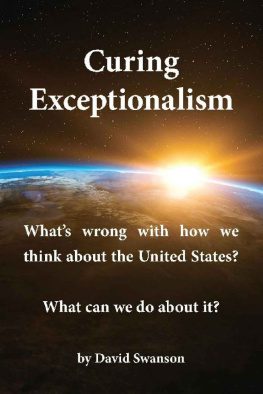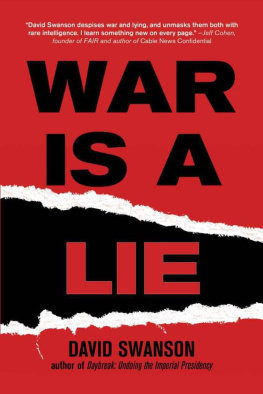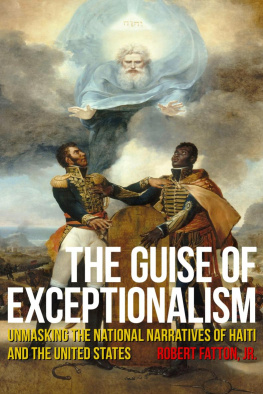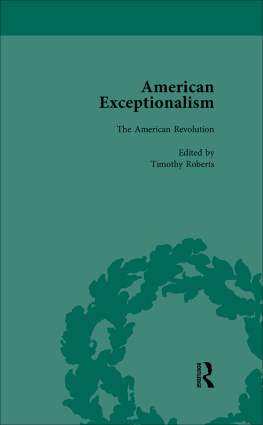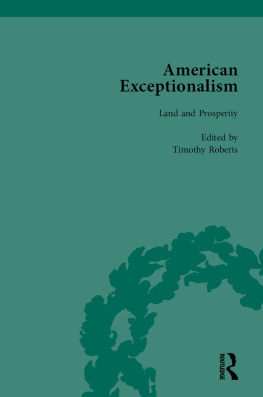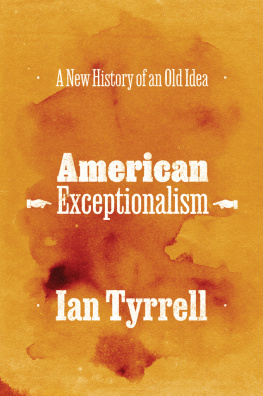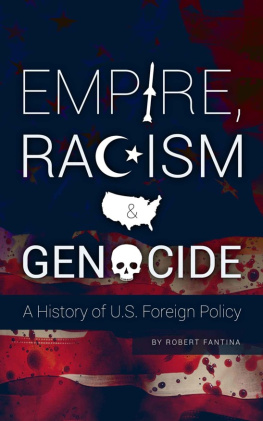Curing
Exceptionalism
What's wrong with how we think about the United States?
What can we do about it?
By David Swanson
Charlottesville, VA
First edition2018
Also by David Swanson
War Is Never Just (2016)
War Is A Lie (2010, 2016)
Killing Is Not A Way of Life (2014)
War No More: The Case For Abolition (2013)
Iraq War Among Worlds Worst Events (2013)
Tube World (2012)
The Military Industrial Complex at 50 (2011)
When The World Outlawed War (2011)
Daybreak: Undoing the Imperial Presidency
and Forming a More Perfect Union (2009)
The 35 Articles of Impeachment (Introduction, 2008)
davidswanson.org
2018 David Swanson
All rights reserved. No part of this book may be reproduced
or transmitted in any form or by any means, including
mechanical, electric, photocopying, recording, or otherwise,
without the prior written permission of the publisher.
Swanson, David, 1969 Dec. 1
Curing Exceptionalism
Book design by David Swanson
Printed in the USA
First Edition / April 2018
ISBN: 978-0-9980859-2-4
Contents
Introduction
U.S. exceptionalism, the idea that the United States of America is superior to other nations, is no more fact-based and no less harmful than racism, sexism, and other forms of bigotry. The purpose of this book is to persuade you of that statement.
The first section of the book is a glorified list of statistics with minimal discussion. Its purpose is to examine as fairly and honestly as possible, with the most reliable data available, how the United States compares with other nations. Is what is often called the "greatest nation on earth" actually greatest in any measurable category? Is it, in fact, the least great in some ways? Is it, in many ways, just kind of average? I think it's important that we first learn these facts and only afterwards discuss them -- even if the more popular order of operations may be just the reverse.
Having established some knowledge of how the United States actually compares with other countries, we'll move on in part two to an examination of how exceptionalists think, relying heavily on their own words. Exceptionalist thinking turns out to have rather little to do with facts, and a great deal to do with an arrogant attitude.
In the third section of the book, I argue that this attitude is not harmless, that in fact it brings a great deal of suffering to both those who engage in it and those impacted by it. Given this understanding, I am compelled to attempt in the book's fourth and final part to suggest what I see as the most promising steps for curing exceptionalism, for developing better ways of thinking and for taking the actions those new thoughts lead to.
I. How the United States Compares with Other Countries
The United States in geographic size is much smaller than Russia, a little smaller than Europe, if Europe is treated as one whole, and by most calculations slightly smaller than Canada or China. The United States is significantly bigger than Brazil or Australia, and dramatically bigger than each of some 200 other countries, including each separate country of Europe.
The United States in population size is dramatically smaller than China or India but significantly larger than every other country on earth.
Because the United States is larger in both area and population than most countries, it's important to look not just at straightforward comparisons but also at per-square-mile and per-capita comparisons whenever relevant and possible.
The U.S. ranks as the top publisher of rankings, hands down. So it's important to look at both U.S. and any non-U.S. sources of rankings that can be found.
Although many in the United States like to think of it as holding first place in many admirable categories, it's hard to actually find a category where this is true. Perhaps the most popular claim is on behalf of "freedom." The United States is said to be the most "free." But virtually no study, from any political perspective, actually makes that finding.
The British-based Legatum Institute, which ranks the United States 18th in overall "prosperity," ranks it 28th in "personal freedom."
Some of these sources' conceptions of freedom are at odds with each other, as well as with my own conception of a good society. The point is that virtually nobody, on the left or the right or anywhere else, ranks the United States as the leader in liberty, by any definition -- not even in the "economic liberty" of capitalism. Related, albeit inversely, to freedom is incarceration, where the United States does rank first in overall number of prisoners, and in per-capita rate of imprisonment (with the possible exception of the Seychelles Islands).
Among those who have looked seriously into such matters and still claimed first place for the United States in some admirable category, the most common category is probably "top-ranked" or "research" universities. It is perhaps not as grand a claim as "Land of the Free," but "land of the good universities" is still a nice title.
The United States is indeed often ranked as having the most overall, and the most top-ranked universities in the world. But both claims are false if a per-capita comparison is used. The United States has also been ranked as producing the most doctoral degrees (PhDs), though that, too, isn't true per capita. Providing a hint at divisions within, the United States may have both the most PhDs and the most people who believe college is bad for you.
Nonetheless, numbers are a place to start, and there do seem to exist some credible numbers related to universities declared by various sources to be "top-ranked." Rankings from the United States all place the U.S. first in most universities in the top 100, but ninth or tenth in the same measurement per capita. Countries that lead the U.S. in at least one study in most universities in the top 100 per capita are Australia, Belgium, Denmark, Finland, Hong Kong, Netherlands, Norway, Singapore, Sweden, Switzerland, and the United Kingdom.
Having the most top universities is certainly significant, and even ranking ninth or tenth in having the most top universities per capita is pretty darn good. Of course, these calculations do not tell us the quality of the lower-ranked universities that most students attend. Nor do they consider the sizes of the universities or the moral character of what is taught in them. They certainly do not consider the cost of the universities or the debt that typical students find themselves in after attending. The United States leads the world in student debt, So one can cheer for the rankings won by top U.S. universities, but a U.S. student is less likely to actually attend any university, and more likely -- if he or she does attend -- to emerge burdened with tremendous debt.
YAY, NUMBER ONE!
Of course, it would be odd for a country near the top in population and area not to rank #1 in some things, and having the most top-ranked universities is a pretty good one. But it does matter to the quality of life in the United States that it is not in first place in a per capita comparison. One way to judge the quality of much of the university education in the United States, and the education of those millions of students who do not attend universities, is to look at primary and secondary education, where the United States ranks mediocre at best. The Programme for International Student Assessment (PISA) ranks U.S. students 38th out of 71 countries in math and 24th in both science and reading.
So, perhaps the United States is not a clear-cut world leader in freedom or education, but surely there must be something else admirable that it leads in, right? Well, there's the Olympic medal count, although it doesn't hold up under a per capita comparison or a geographic area comparison,
Next page
